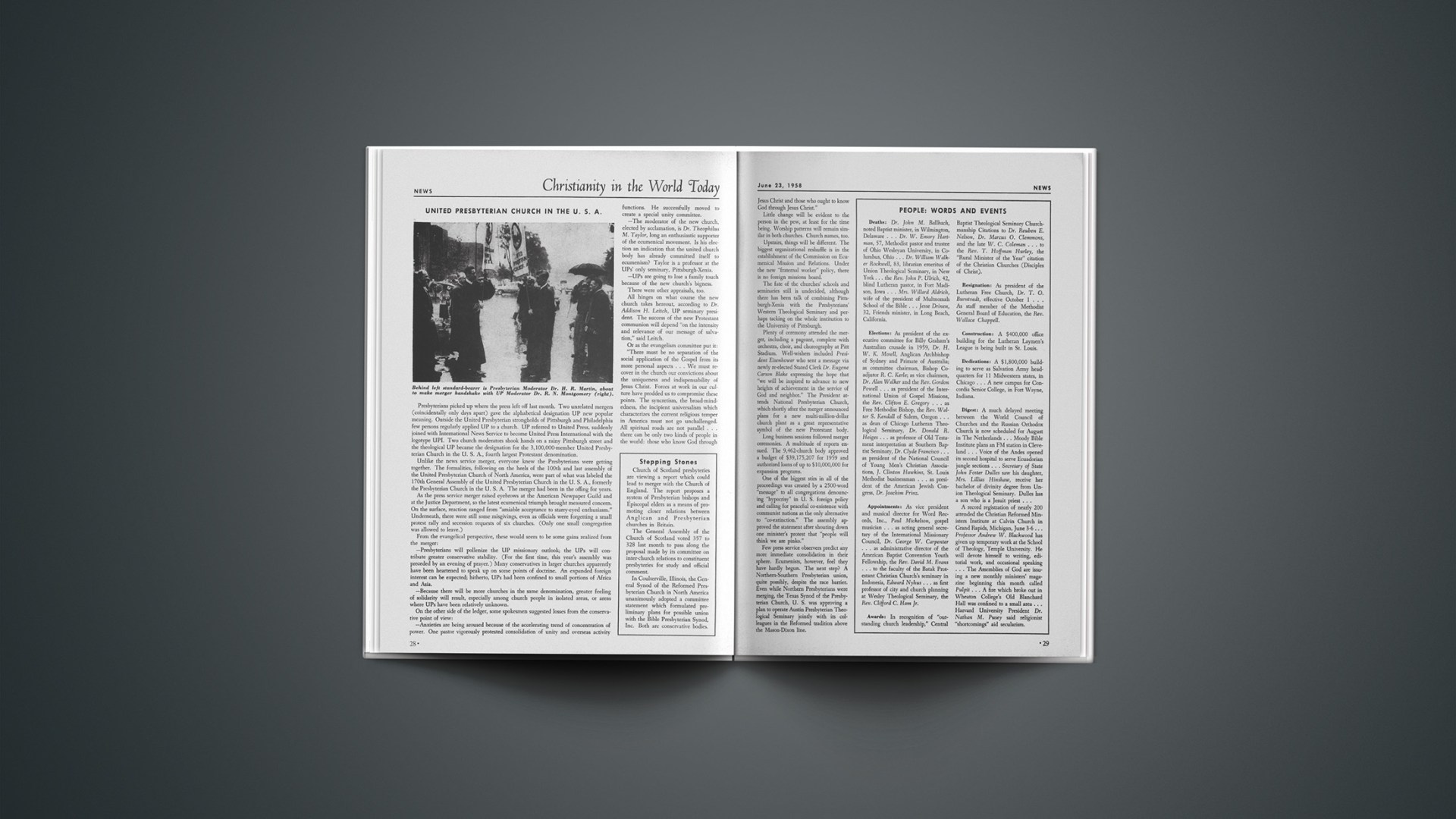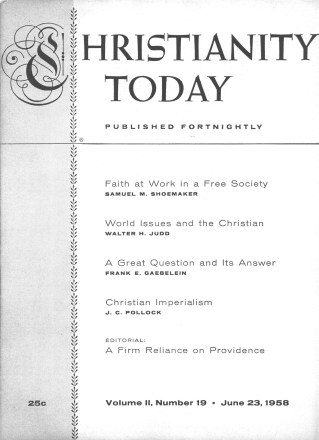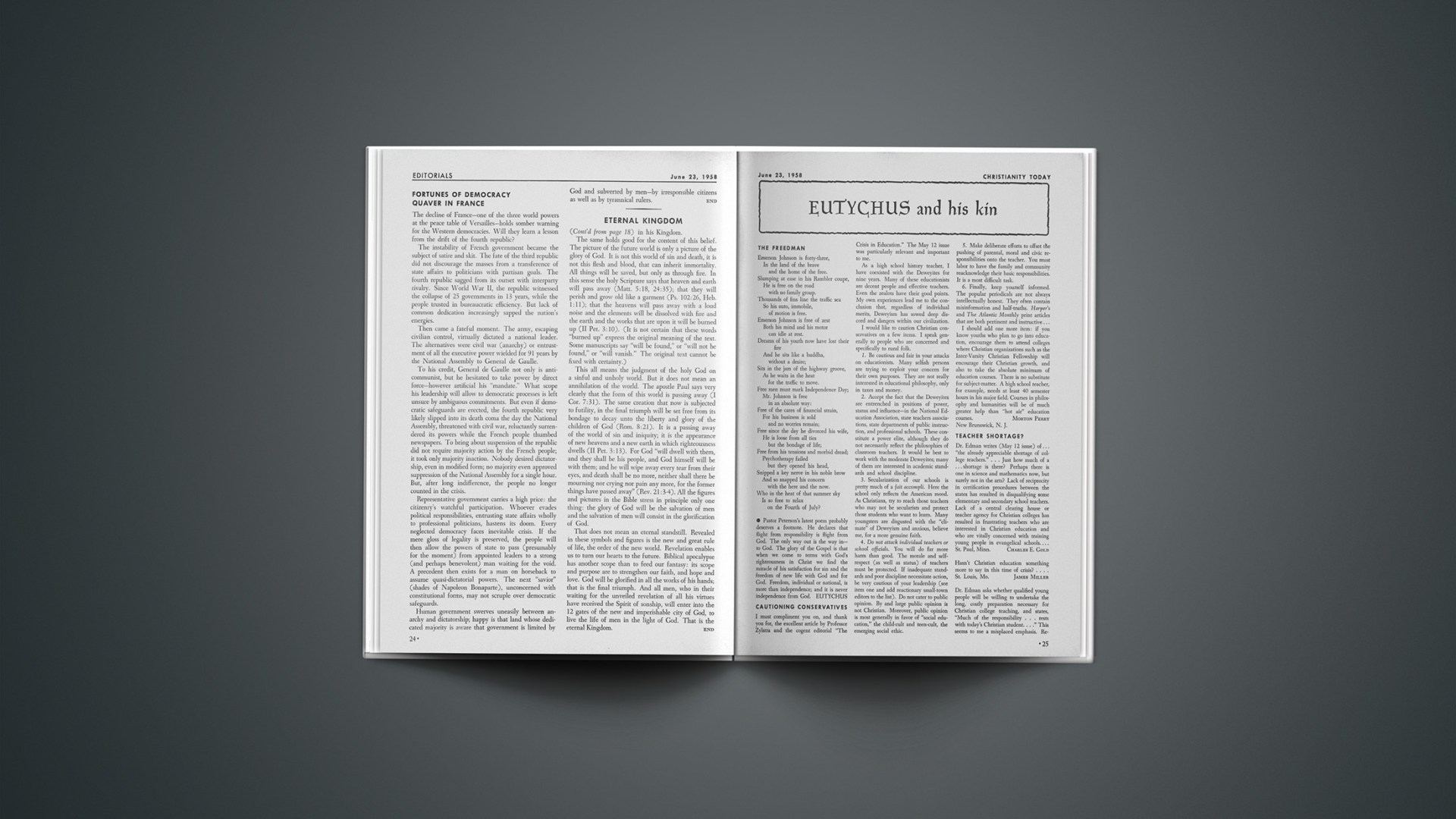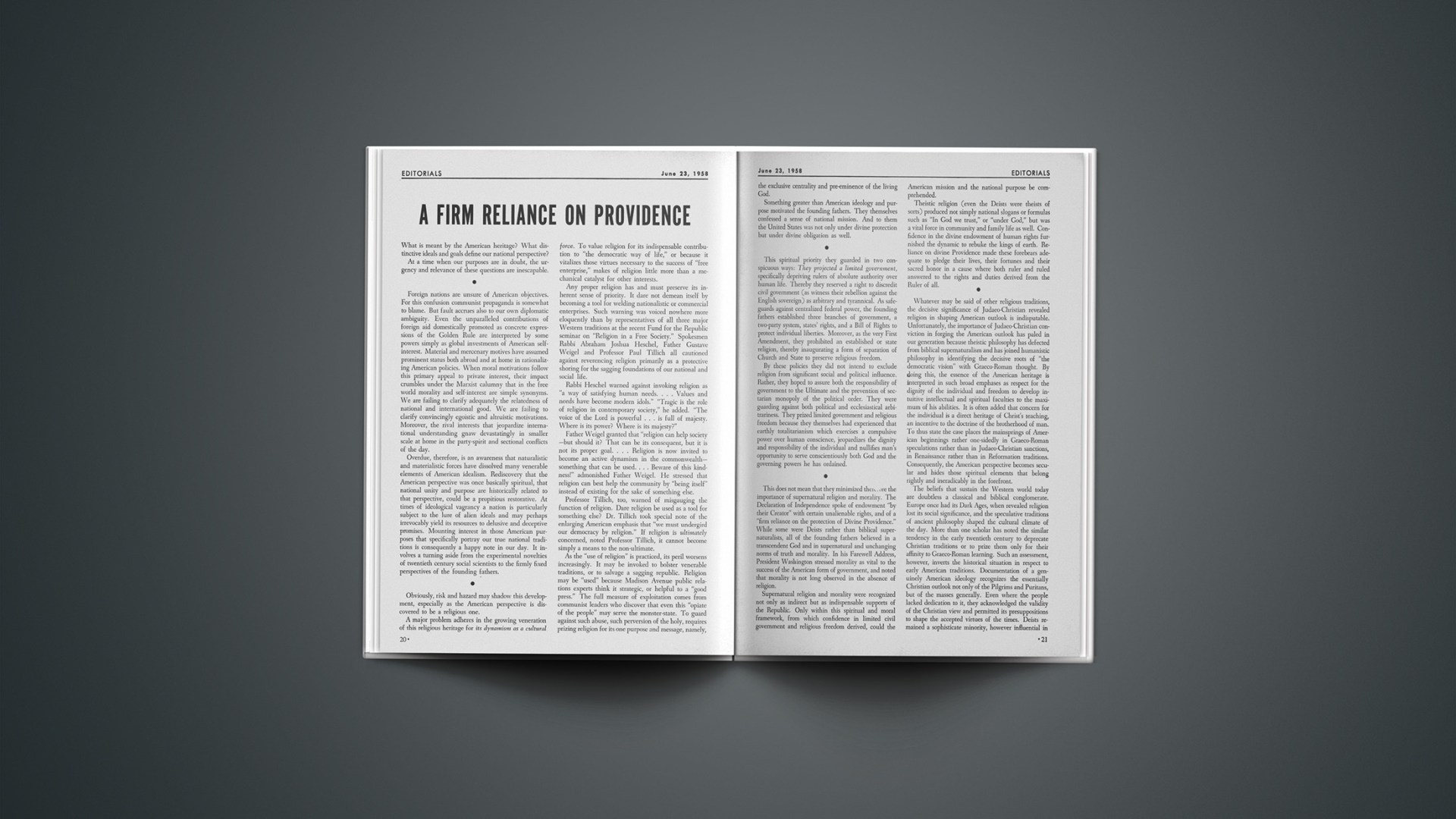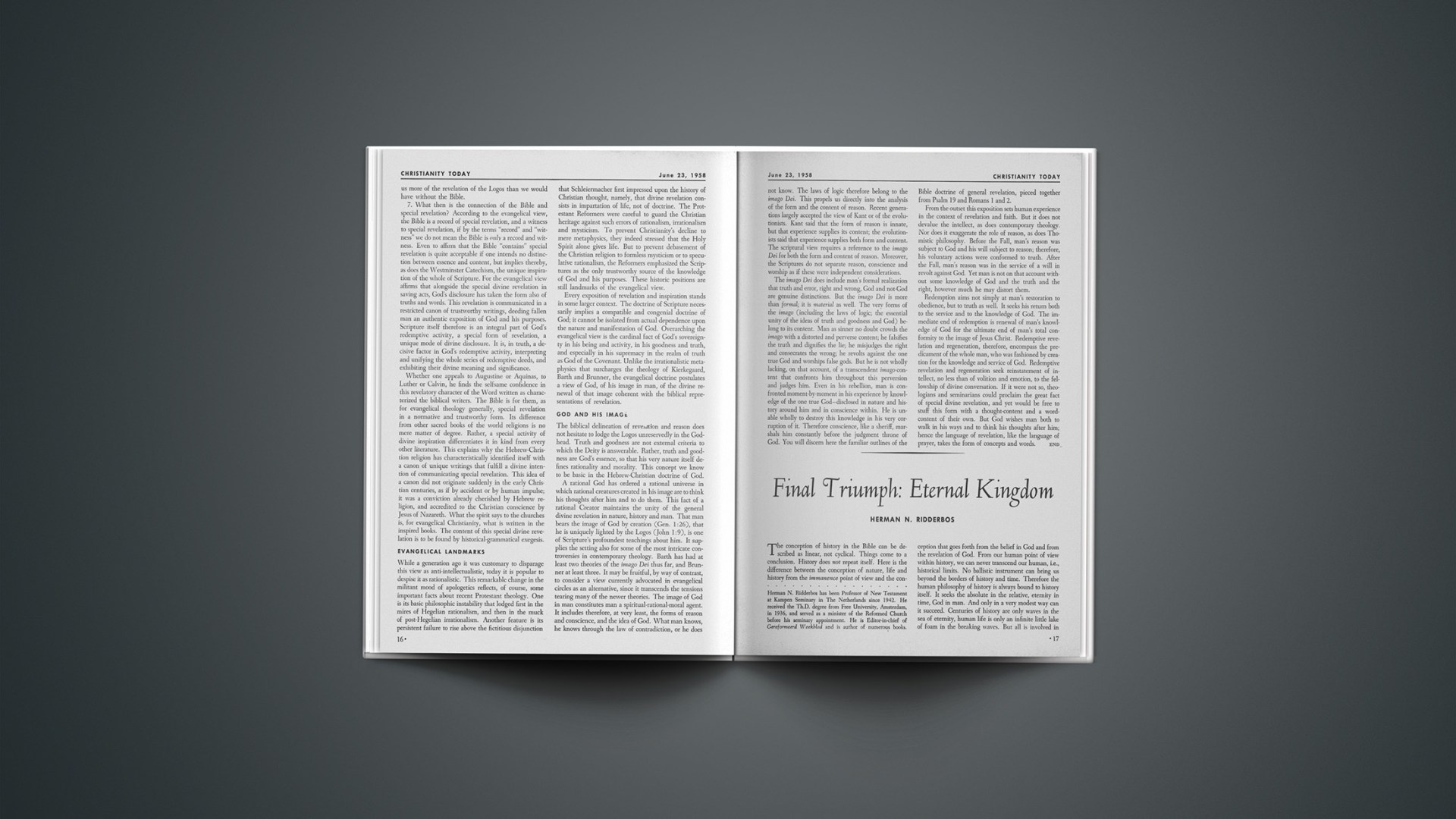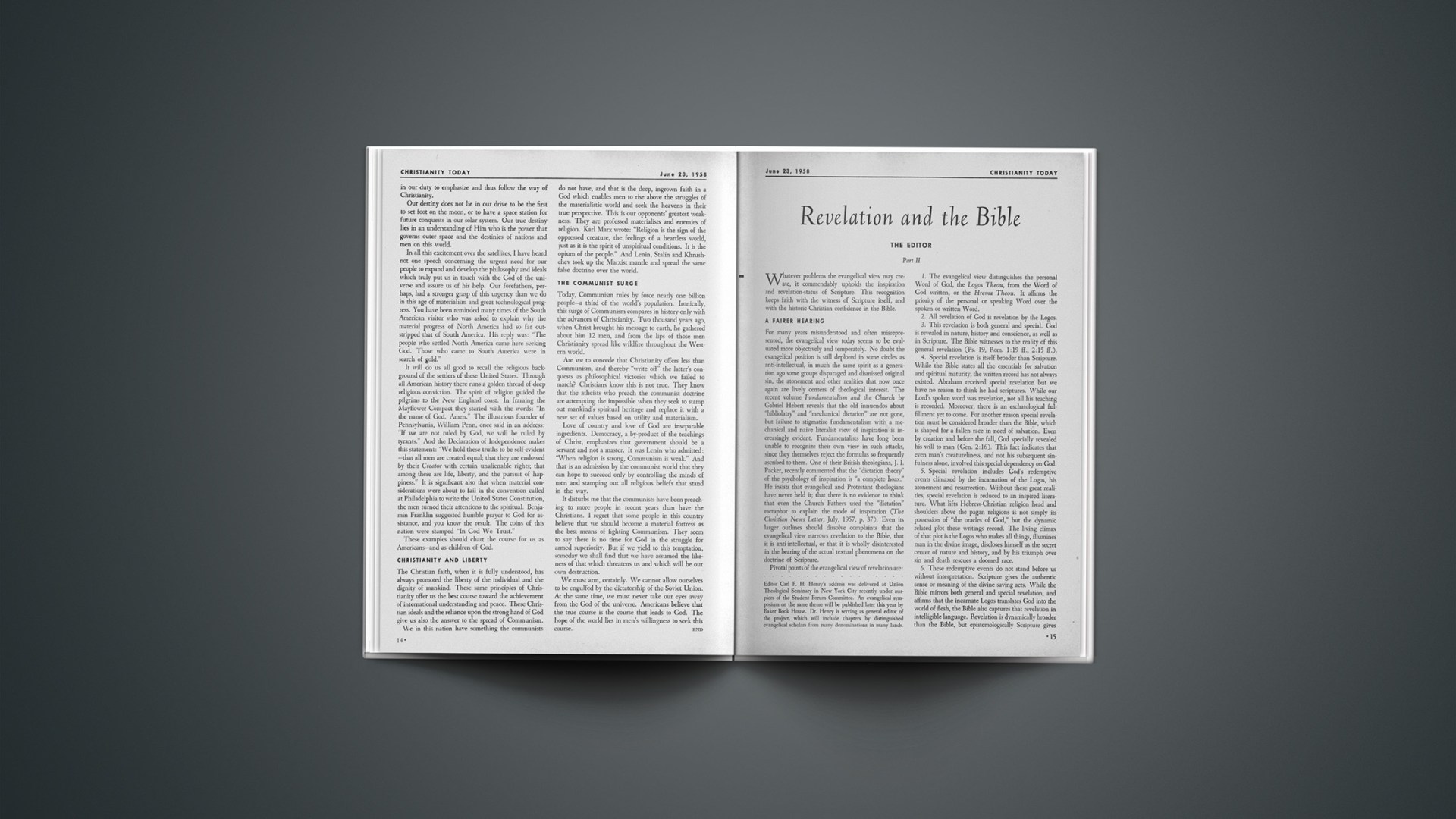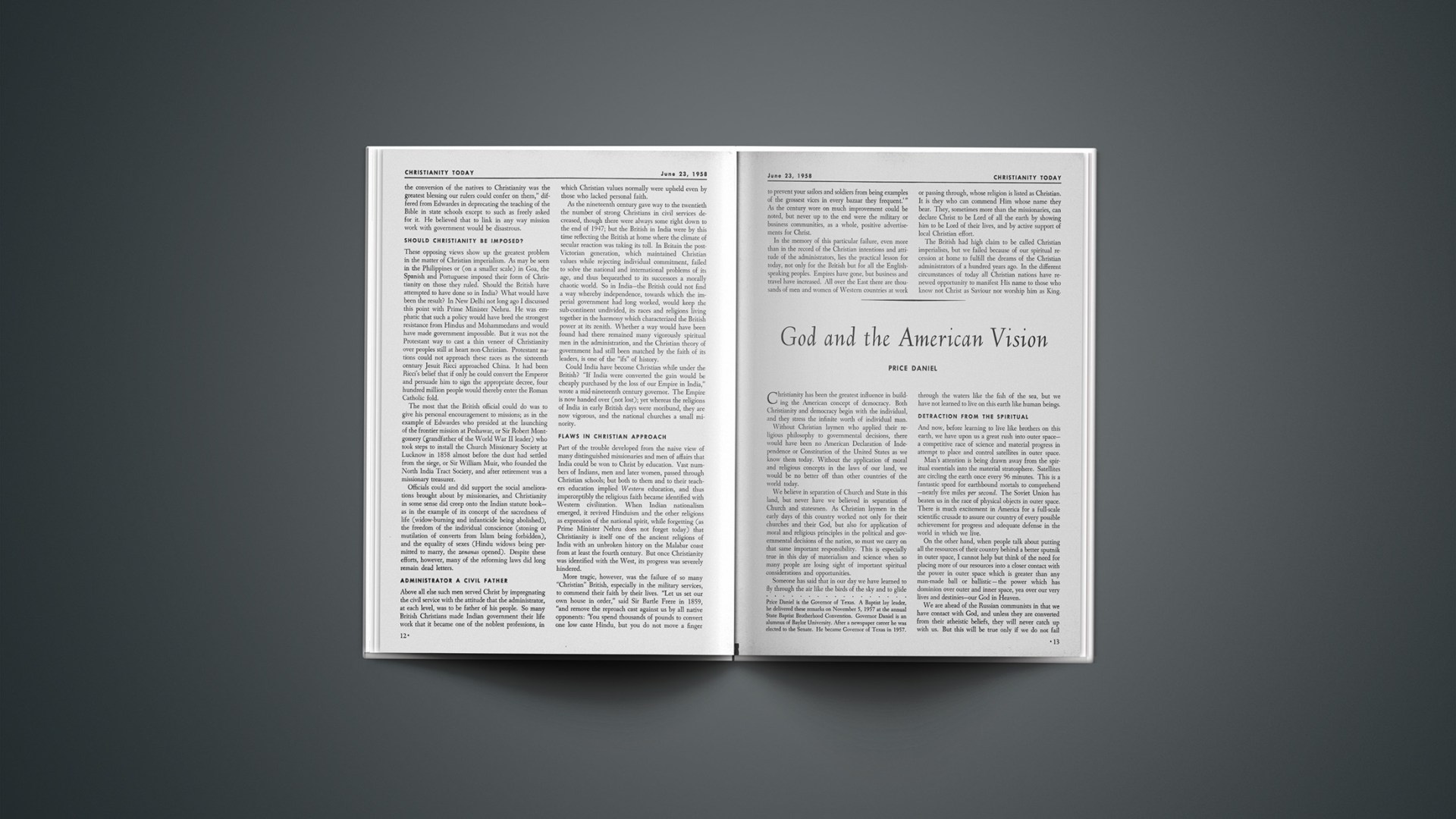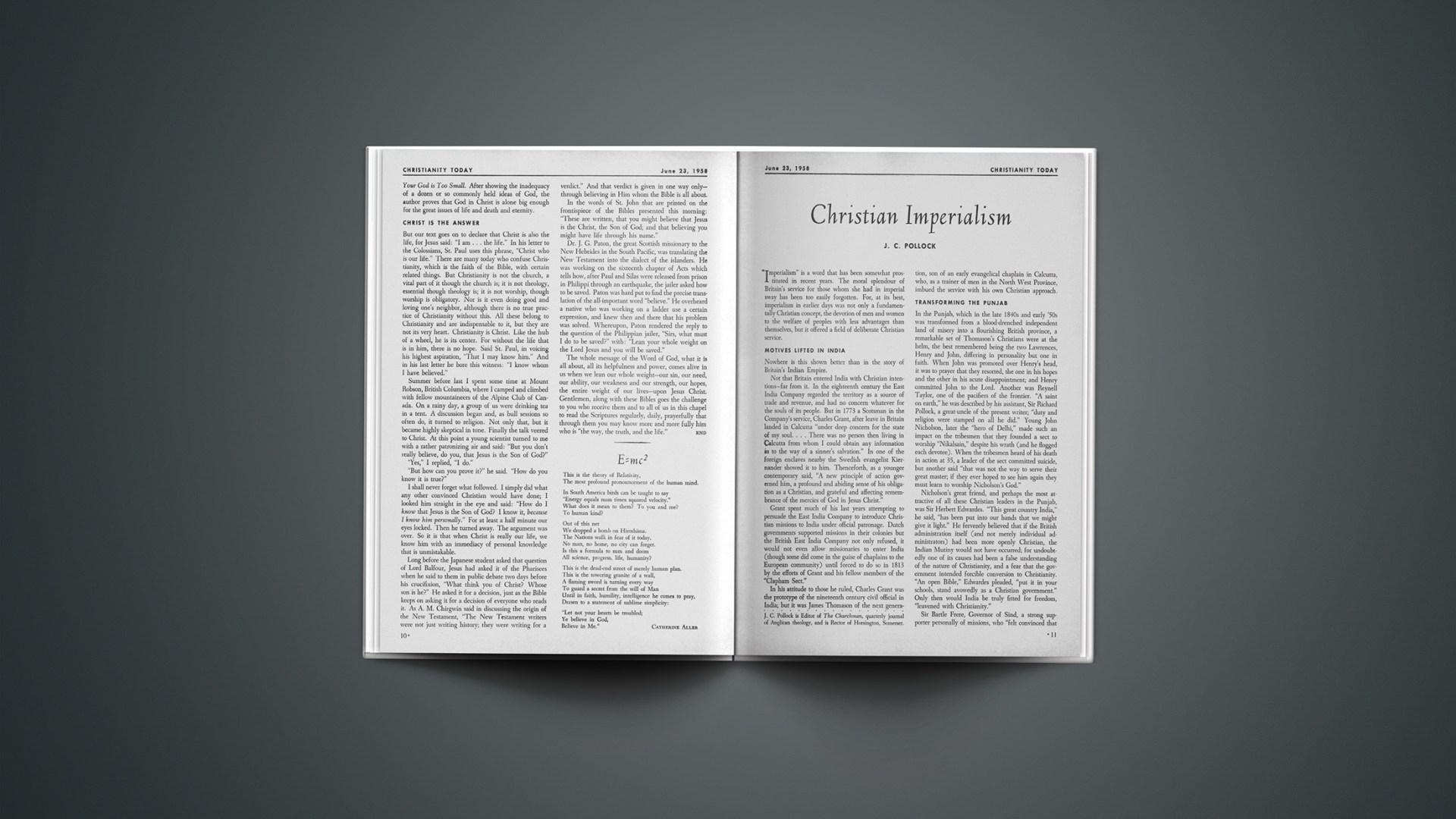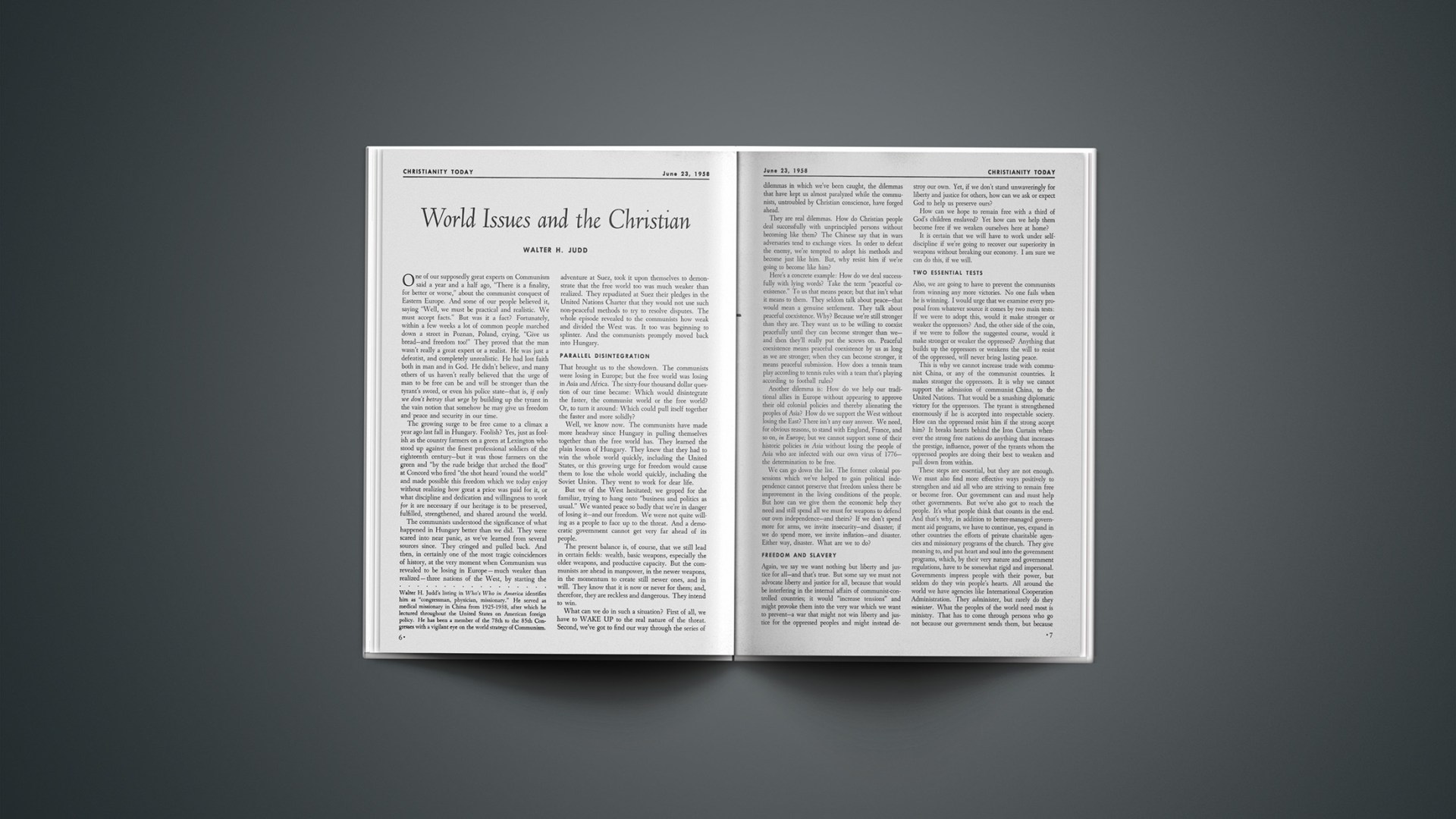NEWS
Christianity in the World Today
Presbyterians picked up where the press left off last month. Two unrelated mergers (coincidentally only days apart) gave the alphabetical designation UP new popular meaning. Outside the United Presbyterian strongholds of Pittsburgh and Philadelphia few persons regularly applied UP to a church. UP referred to United Press, suddenly joined with International News Service to become United Press International with the logotype UPI. Two church moderators shook hands on a rainy Pittsburgh street and the theological UP became the designation for the 3,100,000-member United Presbyterian Church in the U. S. A., fourth largest Protestant denomination.
Unlike the news service merger, everyone knew the Presbyterians were getting together. The formalities, following on the heels of the 100th and last assembly of the United Presbyterian Church of North America, were part of what was labeled the 170th General Assembly of the United Presbyterian Church in the U. S. A., formerly the Presbyterian Church in the U. S. A. The merger had been in the offing for years.
As the press service merger raised eyebrows at the American Newpaper Guild and at the Justice Department, so the latest ecumenical triumph brought measured concern. On the surface, reaction ranged from “amiable acceptance to starry-eyed enthusiasm.” Underneath, there were still some misgivings, even as officials were forgetting a small protest rally and secession requests of six churches. (Only one small congregation was allowed to leave.)
From the evangelical perspective, these would seem to be some gains realized from the merger:
—Presbyterians will pollenize the UP missionary outlook; the UPs will contribute greater conservative stability. (For the first time, this year’s assembly was preceded by an evening of prayer.) Many conservatives in larger churches apparently have been heartened to speak up on some points of doctrine. An expanded foreign interest can be expected; hitherto, UPs had been confined to small portions of Africa and Asia.
—Because there will be more churches in the same denomination, greater feeling of solidarity will result, especially among church people in isolated areas, or areas where UPs have been relatively unknown.
On the other side of the ledger, some spokesmen suggested losses from the conservative point of view:
—Anxieties are being aroused because of the accelerating trend of concentration of power. One pastor vigorously protested consolidation of unity and overseas activity functions. He successfully moved to create a special unity committee.
—The moderator of the new church, elected by acclamation, is Dr. Theophilus M. Taylor, long an enthusiastic supporter of the ecumenical movement. Is his election an indication that the united church body has already committed itself to ecumenism? Taylor is a professor at the UPs’ only seminary, Pittsburgh-Xenia.
—UPs are going to lose a family touch because of the new church’s bigness.
There were other appraisals, too.
All hinges on what course the new church takes hereout, according to Dr. Addison H. Leitch, UP seminary president. The success of the new Protestant communion will depend “on the intensity and relevance of our message of salvation,” said Leitch.
Stepping Stones
Church of Scotland presbyteries are viewing a report which could lead to merger with the Church of England. The report proposes a system of Presbyterian bishops and Episcopal elders as a means of promoting closer relations between Anglican and Presbyterian churches in Britain.
The General Assembly of the Church of Scotland voted 357 to 328 last month to pass along the proposal made by its committee on inter-church relations to constituent presbyteries for study and official comment.
In Coulterville, Illinois, the General Synod of the Reformed Presbyterian Church in North America unanimously adopted a committee statement which formulated preliminary plans for possible union with the Bible Presbyterian Synod, Inc. Both are conservative bodies.
Or as the evangelism committee put it:
“There must be no separation of the social application of the Gospel from its more personal aspects … We must recover in the church our convictions about the uniqueness and indispensability of Jesus Christ. Forces at work in our culture have prodded us to compromise these points. The syncretism, the broad-mindedness, the incipient universalism which characterizes the current religious temper in America must not go unchallenged. All spiritual roads are not parallel … there can be only two kinds of people in the world: those who know God through Jesus Christ and those who ought to know God through Jesus Christ.”
Little change will be evident to the person in the pew, at least for the time being. Worship patterns will remain similar in both churches. Church names, too.
Upstairs, things will be different. The biggest organizational reshuffle is in the establishment of the Commission on Ecumenical Mission and Relations. Under the new “fraternal worker” policy, there is no foreign missions board.
The fate of the churches’ schools and seminaries still is undecided, although there has been talk of combining Pittsburgh-Xenia with the Presbyterians’ Western Theological Seminary and perhaps tacking on the whole institution to the University of Pittsburgh.
Plenty of ceremony attended the merger, including a pageant, complete with orchestra, choir, and choreography at Pitt Stadium. Well-wishers included President Eisenhower who sent a message via newly re-elected Stated Clerk Dr. Eugene Carson Blake expressing the hope that “we will be inspired to advance to new heights of achievement in the service of God and neighbor.” The President attends National Presbyterian Church, which shortly after the merger announced plans for a new multi-million-dollar church plant as a great representative symbol of the new Protestant body.
Long business sessions followed merger ceremonies. A multitude of reports ensued. The 9,462-church body approved a budget of $39,175,207 for 1959 and authorized loans of up to $10,000,000 for expansion programs.
One of the biggest stirs in all of the proceedings was created by a 2500-word “message” to all congregations denouncing “hypocrisy” in U. S. foreign policy and calling for peaceful co-existence with communist nations as the only alternative to “co-extinction.” The assembly approved the statement after shouting down one minister’s protest that “people will think we are pinko.”
Few press service observers predict any more immediate consolidation in their sphere. Ecumenists, however, feel they have hardly begun. The next step? A Northern-Southern Presbyterian union, quite possibly, despite the race barrier. Even while Northern Presbyterians were merging, the Texas Synod of the Presbyterian Church, U. S. was approving a plan to operate Austin Presbyterian Theological Seminary jointly with its colleagues in the Reformed tradition above the Mason-Dixon line.
People: Words And Events
Deaths: Dr. John M. Ballbach, noted Baptist minister, in Wilmington, Delaware … Dr. W. Emory Hartman, 57, Methodist pastor and trustee of Ohio Wesleyan University, in Columbus, Ohio … Dr. William Walker Rockwell, 83, librarian emeritus of Union Theological Seminary, in New York … the Rev. John P. Ulrich, 42, blind Lutheran pastor, in Fort Madison, Iowa … Mrs. Willard Aldrich, wife of the president of Multnomah School of the Bible … Jesse Drinen, 32, Friends minister, in Long Beach, California.
Elections: As president of the executive committee for Billy Graham’s Australian crusade in 1959, Dr. H. W. K. Mowll, Anglican Archbishop of Sydney and Primate of Australia; as committee chairman, Bishop Coadjutor R. C. Kerle; as vice chairmen, Dr. Alan Walker and the Rev. Gordon Powell … as president of the International Union of Gospel Missions, the Rev. Clifton E. Gregory … as Free Methodist Bishop, the Rev. Walter S. Kendall of Salem, Oregon … as dean of Chicago Lutheran Theological Seminary, Dr. Donald R. Heiges … as professor of Old Testament interpretation at Southern Baptist Seminary, Dr. Clyde Francisco … as president of the National Council of Young Men’s Christian Associations, J. Clinton Hawkins, St. Louis Methodist businessman … as president of the American Jewish Congress, Dr. Joachim Prinz.
Appointments: As vice president and musical director for Word Records, Inc., Paul Mickelson, gospel musician … as acting general secretary of the International Missionary Council, Dr. George W. Carpenter … as administrative director of the American Baptist Convention Youth Fellowship, the Rev. David M. Evans … to the faculty of the Batak Protestant Christian Church’s seminary in Indonesia, Edward Nyhus … as first professor of city and church planning at Wesley Theological Seminary, the Rev. Clifford C. Ham Jr.
Awards: In recognition of “outstanding church leadership,” Central Baptist Theological Seminary Churchmanship Citations to Dr. Reuben E. Nelson, Dr. Marcus O. Clemmons, and the late W. C. Coleman … to the Rev. T. Hoffman Hurley, the “Rural Minister of the Year” citation of the Christian Churches (Disciples of Christ).
Resignation: As president of the Lutheran Free Church, Dr. T. O. Burntvedt, effective October 1 … As staff member of the Methodist General Board of Education, the Rev. Wallace Chappell.
Construction: A $400,000 office building for the Lutheran Laymen’s League is being built in St. Louis.
Dedications: A $1,800,000 building to serve as Salvation Army headquarters for 11 Midwestern states, in Chicago … A new campus for Concordia Senior College, in Fort Wayne, Indiana.
Digest: A much delayed meeting between the World Council of Churches and the Russian Orthodox Church is now scheduled for August in The Netherlands … Moody Bible Institute plans an FM station in Cleveland … Voice of the Andes opened its second hospital to serve Ecuadorian jungle sections … Secretary of State John Foster Dulles saw his daughter, Mrs. Lillias Hinshaw, receive her bachelor of divinity degree from Union Theological Seminary. Dulles has a son who is a Jesuit priest …
A record registration of nearly 200 attended the Christian Reformed Ministers Institute at Calvin Church in Grand Rapids, Michigan, June 3–6 … Professor Andrew W. Blackwood has given up temporary work at the School of Theology, Temple University. He will devote himself to writing, editorial work, and occasional speaking … The Assemblies of God are issuing a new monthly ministers’ magazine beginning this month called Pulpit … A fire which broke out in Wheaton College’s Old Blanchard Hall was confined to a small area … Harvard University President Dr. Nathan M. Pusey said religionist “shortcomings” aid secularism.
Assembly Roundup
Among developments at spring religious gatherings:
BOSTON—Dr. Dana McLean Greeley, who describes himself as “somewhat to the right of center” on the issue of whether ties should be broken with Christianity, was elected president of the American Unitarian Association. Greeley piled up 823 votes to 720 for Dr. Ernest W. Kuebler, reportedly the candidate of those who seek to sever the Christian link, at the group’s 133rd annual meeting. Kuebler had the support of the organization’s board of directors. Greeley was a “grass roots” candidate. It was the first contested election in 20 years for the presidency of the Unitarian assembly.
BUCK HILL FALLS, Pennsylvania—At its 152nd annual General Synod, the Reformed Church in America declared in an adopted report that “total abstinence is the preferred behavior for all people in regard to alcoholic beverages.” A resolution urged the National Council of Churches’ Broadcasting and Film Commission “to see that everything possible be done to present biblical material … authoritatively.”
COLUMBUS, Ohio—The General Association of Regular Baptists added 45 churches during its 27th annual conference. Some 850 messengers attended.
VANCOUVER—More than 400 delegates to the Pentecostal Assemblies of Canada 21st biennial conference heard their missionary secretary, the Rev. G. R. Upton, list four challenges that face the church in its missionary endeavors: “A militant revival of Mohammedanism in the Near East and Africa; a resurgence of Buddhism in Asia; the subtle appeal of Communism to the under-privileged; and, at home, the highly-developed North American system of worshiping at the shrines of entertainment, sex and indulgence.”
QUITO—Nearly 200 missionaries representing 13 societies gathered for the ninth annual retreat of the Inter-Mission Fellowship of Ecuador. Dr. Theodore Epp, U. S. radio evangelist who was principal speaker, centered his messages on the conference theme: “On to Perfection.”
DUBLIN—The General Synod of the Church of Ireland rejected by overwhelming majority a suggestion that the word “Anglican” appear on notice boards.
ROME—The annual synod of the Methodist church in Italy adopted a plan of cooperation with the Waldensian church. The plan provides for integration in pastoral care and in evangelism of the ministers of one denomination into the ministry of the other.

